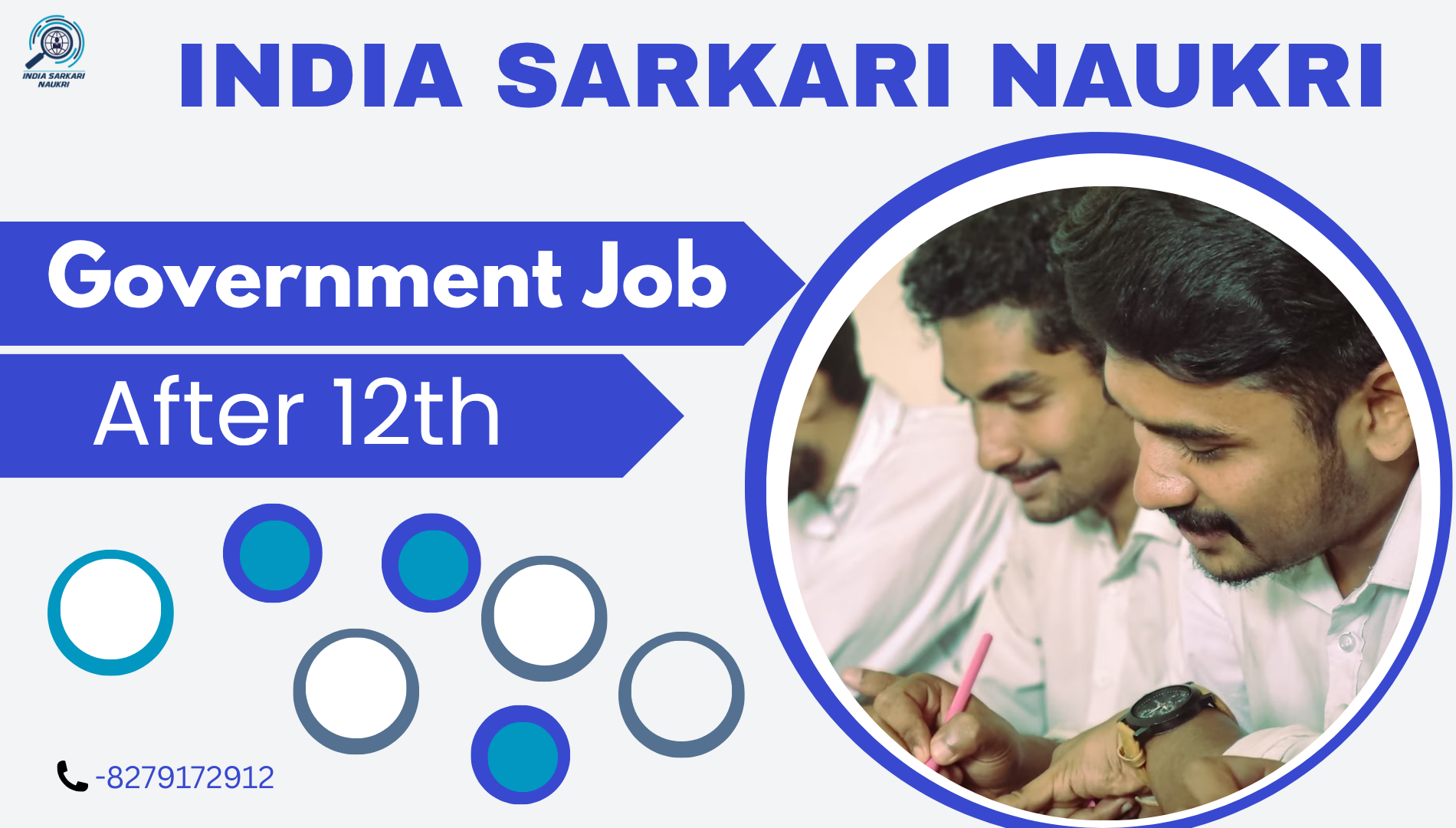For numerous young individuals in India, securing a government position after completing class 12 is perceived as a significant life objective. It is easy to understand the rationale behind this. A government job offers consistent income, job stability, regular working hours, and benefits that are often unmatched by private sector companies. This situation provides comfort to parents and a sense of security to the individual.
Understanding the Challenge and the Path Forward
However, determining the pathway to achieve this goal immediately after school can resemble standing at the base of a vast staircase. Therefore, let us dissect the process step by step, exploring the available options, understanding the examination procedures, and identifying actions you can take now to enhance your prospects.
What Jobs Are Available After 12th?
Initially, it is essential to comprehend what opportunities are available with a 12th pass certificate. Not all government positions are accessible to you, many higher-level roles require a degree. Nevertheless, there are numerous positions that do not.
SSC CHSL: A Major Gateway
Some of the most significant opportunities arise through the Staff Selection Commission (SSC). The SSC CHSL exam (Combined Higher Secondary Level) is particularly important for students who have completed their 12th grade. Successfully passing this exam can lead to roles such as Lower Division Clerk, Data Entry Operator, Postal Assistant, or Sorting Assistant. These positions are primarily clerical in nature, but they offer stability and potential for advancement if you remain committed.
Opportunities in Indian Railways
The railway sector presents another substantial opportunity. Indian Railways stands as one of the largest employers globally, recruiting thousands annually. They offer positions such as Ticket Collector, Clerk, Typist, or Assistant. The Railway Recruitment Board (RRB) oversees these examinations. While they are competitive, the syllabus is straightforward, and notifications are issued regularly.
Join the Defence Forces After 12th
For those seeking a more dynamic role or wishing to serve the nation directly, the defence forces provide a viable pathway. The National Defence Academy (NDA) exam is among the most recognized avenues. Male candidates aged between 16.5 and 19.5 years are eligible to take the NDA exam and undergo training to become officers in the Army, Navy, or Air Force.
In addition to the NDA, the Army, Navy, and Air Force also recruit 12th pass candidates for positions as soldiers, airmen, sailors, or clerks through various entry schemes. These positions necessitate meeting physical standards, making fitness equally important as passing the written examination.
Police and Paramilitary Roles
The police and paramilitary organizations such as BSF, CISF, and CRPF also accept candidates who have completed the 12th grade for roles as constables or head constables. State police departments conduct their own recruitment processes. Typically, these positions require a physical assessment in addition to the written test, including activities like running, push-ups, long jumps, and more. Therefore, if you are interested in this career path, maintaining physical fitness should be an integral part of your daily regimen.
Other Government Job Opportunities
Certain state government offices and local municipal corporations also recruit clerks, junior assistants, or typists who only require a 12th-grade certificate.
Banking Sector: Limited But Possible
The banking sector is more complex. Most public banks now prefer graduates for clerical positions, although some cooperative and rural banks still accept 12th pass candidates for lower-level roles.
Entrance Exams Are the Key
Nearly every Latest government job available after completing the 12th grade shares a common requirement: an entrance examination. There is no alternative to this. Some positions may include physical assessments or skill evaluations (such as typing), but passing the written examination is the first step.
Exam Syllabus and Preparation Strategy
The subjects generally remain consistent: general knowledge, basic mathematics, reasoning, and English. The specific format may vary depending on whether it is for SSC, RRB, NDA, or police recruitment, but the fundamental concepts remain the same.
Use Official Notifications and Past Papers
To successfully navigate the examination process, the initial step is to thoroughly examine the syllabus. Begin by downloading the official notification and previous examination papers relevant to your target exam. Analyze them meticulously, line by line. Avoid placing your trust in arbitrary lists found on platforms such as YouTube or Telegram; the official notification is your most reliable resource.
Right Books and Study Materials Matter
Once you have a clear understanding of your study objectives, acquire the appropriate textbooks. The NCERT books from grades 6 to 10 prove to be unexpectedly beneficial for enhancing general knowledge and foundational mathematics skills. For current affairs, select a trustworthy newspaper; The Hindu or Indian Express are favored by serious candidates. Refrain from spending excessive time reading multiple newspapers; one is sufficient if you maintain consistency.
Create a Realistic Study Plan
Develop a study schedule that is realistic and manageable. It is unnecessary to commit to studying 12 hours a day from the outset. Begin with 4 to 5 hours of concentrated study, free from distractions such as your phone. Focus on one subject at a time and allow yourself breaks. Engage in mock tests on a weekly basis, as they are far more advantageous than repeatedly reviewing the same notes.
Typing and Physical Fitness Are Critical for Some Roles
For positions such as Data Entry Operator or Clerk, typing speed is crucial. Therefore, practice typing on a daily basis if this skill is required for the role. In the case of defense or police positions, regular running and strength training are essential. Many candidates fail the physical assessment after successfully passing the written examination; ensure you do not become one of them.
Stay Updated with Official Websites
Another often overlooked aspect is the importance of checking official websites. Do not solely depend on coaching centers or Telegram groups for updates regarding application openings. Make it a habit to bookmark the websites of the SSC, RRB, UPSC, and your respective state service commission. Review them weekly, as deadlines can pass quickly.
Coaching Classes: Optional But Useful
If financially feasible, enrolling in coaching classes can be beneficial, particularly for challenging mathematics or reasoning sections. However, they are not a guaranteed solution. Numerous individuals successfully pass these examinations by studying independently, utilizing textbooks, YouTube lectures, and mock tests. Ultimately, the key factor is consistency, rather than the amount spent on coaching.
Avoid Scams and Shortcuts
There’s another trap to avoid — scams. People still get cheated by agents who promise a government job for money. There is no backdoor. You can only get selected by passing the exam and interview. If anyone says they have “sources”, walk away. Spend that money on good books instead.
Have a Backup Plan
It’s also smart to have a backup plan. Government exams are tough. Lakhs apply for a few thousand seats. Some clear it in one attempt, some take three or four tries, some never do. So think ahead. If possible, enroll in a degree or diploma while you prepare. If you get the job, great. If not, you’re not stuck.
Patience and Consistency Are Your Greatest Tools
Patience is half the battle. Some notifications take months, some results take longer. It’s normal to feel restless. Find a study group, stay off distracting apps, and remind yourself why you started.
Conclusion
In the end, there’s no single magic formula for landing a government job after 12th. But the path is clear — know which jobs you can apply for, understand the exam, gather the right books, make a plan, stay fit if required, avoid shortcuts, and trust the process. Thousands do it every year, coming from villages, towns, and cities just like yours. With smart work and steady effort, so can you.


